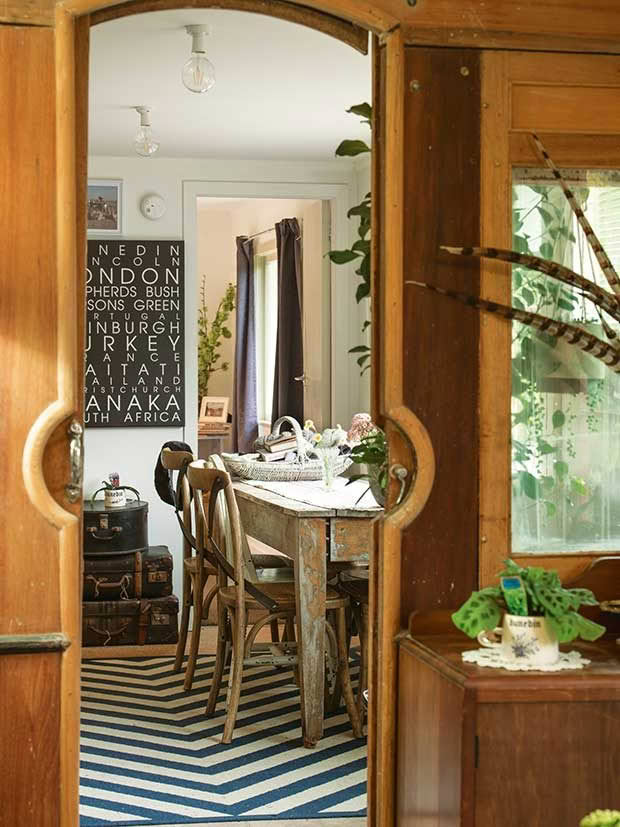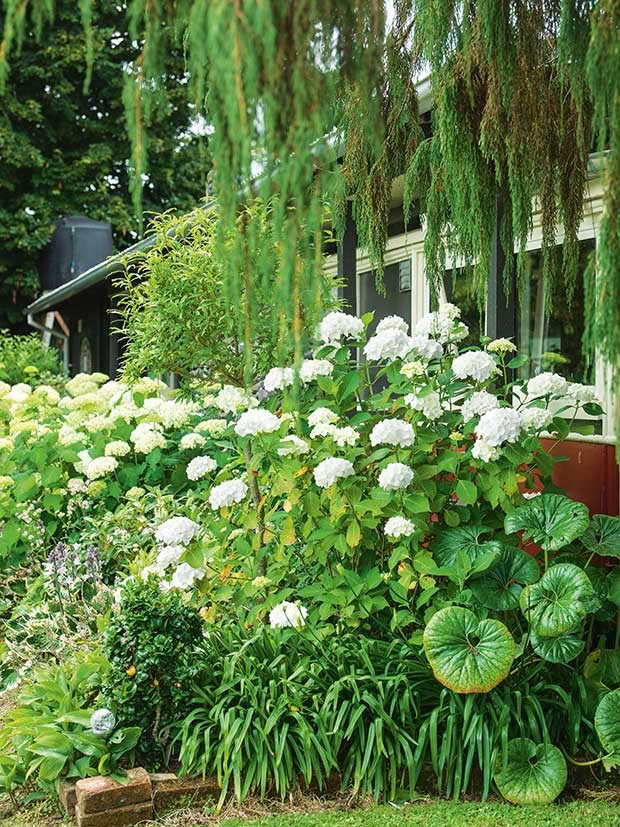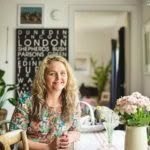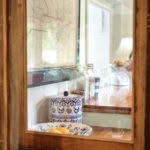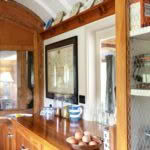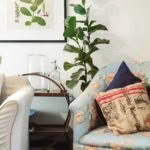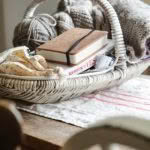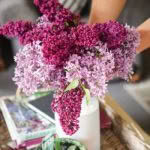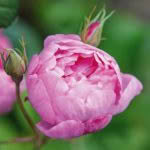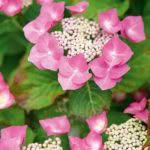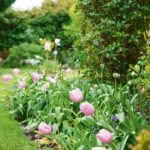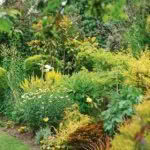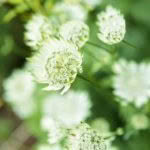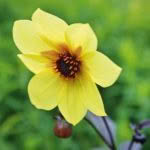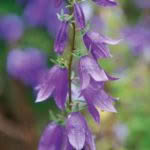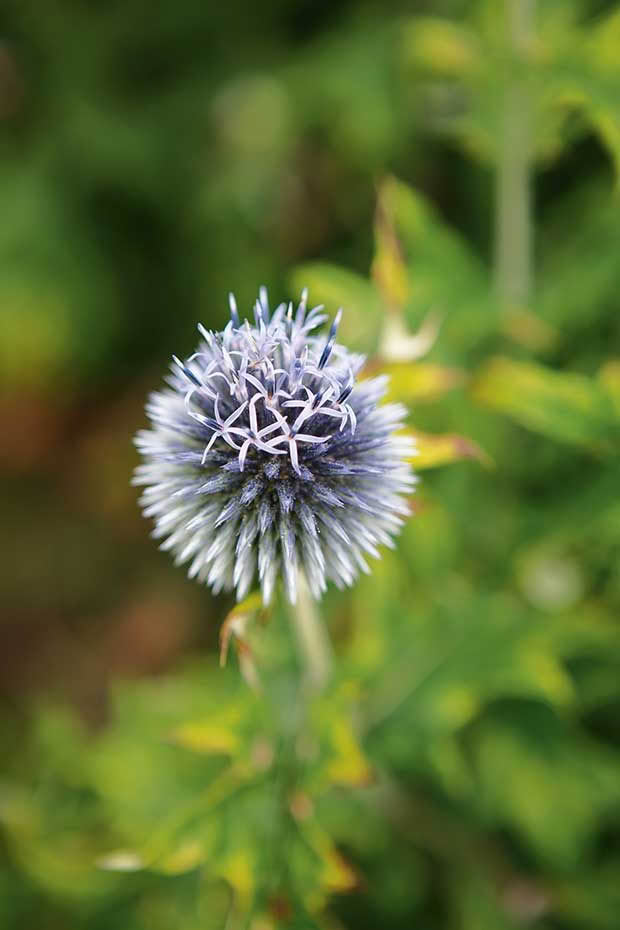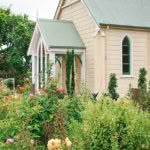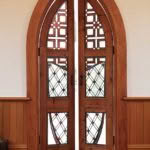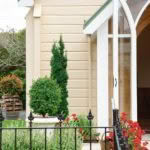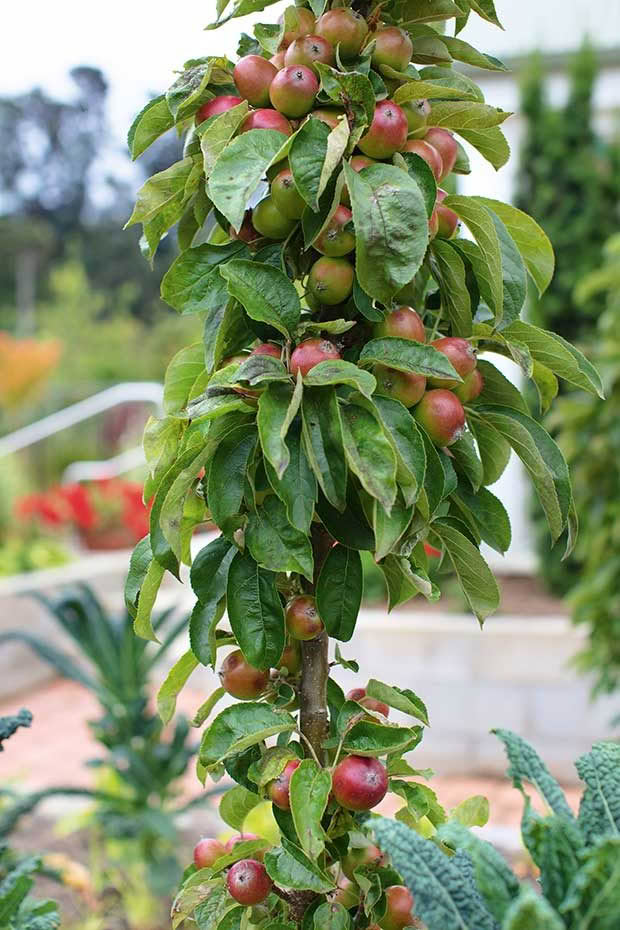Explore Sally Brown of Blueskin Bay Nurseries’ converted tram house and beautiful flower garden
If this green-fingered Dunedin landscape architect had her way, the entire world would be a massive garden with flowers bursting into bloom all year round.
Words: Kate Coughlan Photos: Guy Frederick
Three decades ago — and quite organically — Sally Brown’s parents Mark and Clare Brown established a business at Waitati on the southern shores of Blueskin Bay. Little by little Mark, who had a diploma in horticulture and a liking for plants, grew his garden-maintenance set-up into a flourishing plant wholesaler while Clare, a chemist by profession, tested her retail skills by selling plants from a house along the main road. Today, Blueskin Bay Nurseries includes a garden centre, a café and a function venue as well as the original wholesale operation.
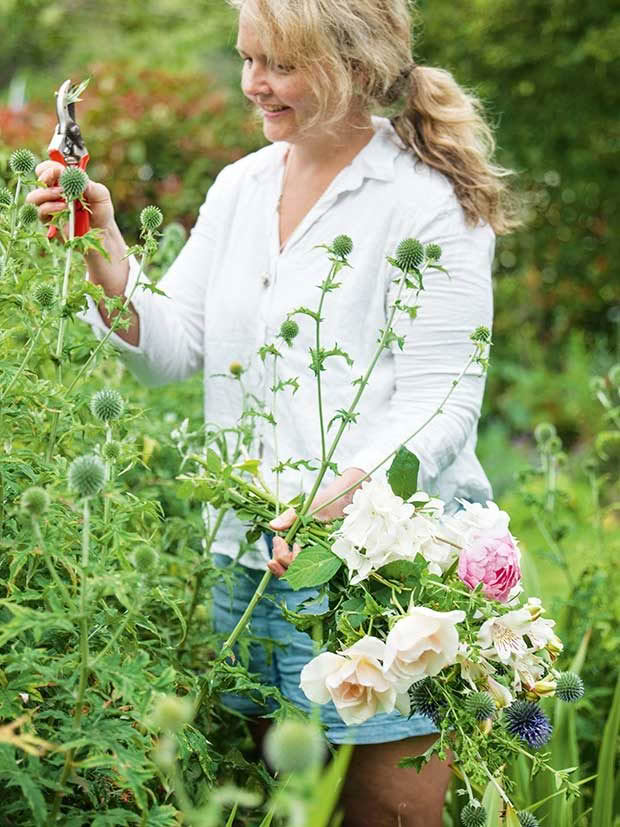
From a very young age, it was clear Sally would be a gardener and these days she wields a pair of clippers with confidence. “I am not afraid to prune roses back hard; it opens them up and helps them perform better.”
Back in the day, observers said the couple were mad to establish a garden centre so far from the city (Waitati is nearly 20 kilometres north of Dunedin) and predicted they’d have trouble attracting customers. But on clement weekends, the Browns would give their best petunias to be a whole lot further from the city. Anything to slow the relentless stream of traffic turning into the carpark.“On a sunshine-y spring day, the world turns up here,” says Sally. “It can be mad.”
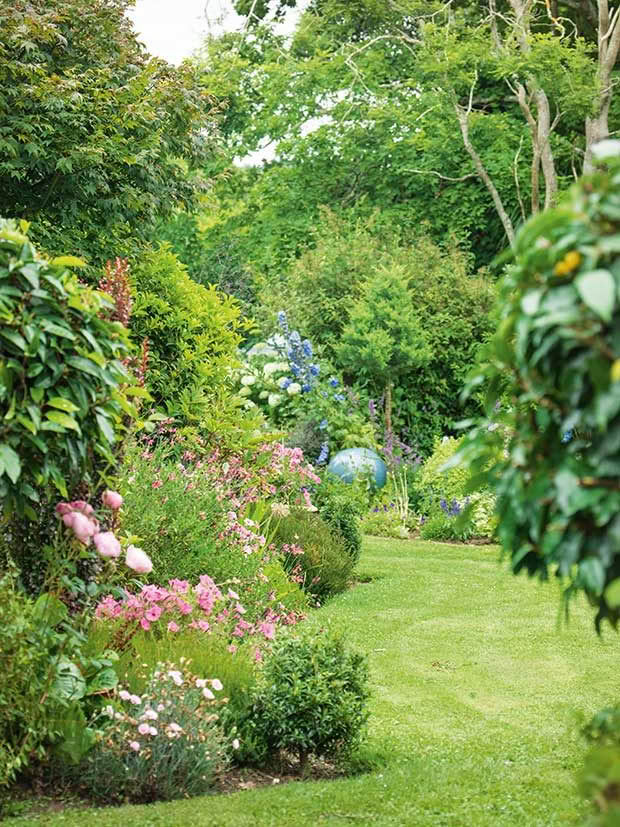
Sally Brown’s garden is planned like a colour wheel so that something is in bloom every season. Here the blue ceramic ball draws the eye past the border of pink roses, salvias, delphiniums and petunias.
Little can be left to chance now as the three linchpins of the venture, one of the larger employers in the East Otago coastal area with up to 20 permanent staff, whirl about the property keeping it all ticking over. Mark, Claire and Sally — who, like her parents, is obsessed with all things green — work together on the expanding business and venue, a restored 100-plus-year-old deconsecrated Catholic church used for lectures and public classes and surrounded by vegetable gardens that supply the café daily with greens.
Mark and Clare’s eldest child, Jock, lives in South Africa where he is married and has a small daughter, Heidi, who her aunt Sally says, has the whole family wrapped around her little finger. Mark and Clare take time away from the busy business to visit Jock, his wife Pippa, and their granddaughter. Sally’s younger brother Hugh, who has down’s syndrome, stays with Sally while their parents are away. A good worker, he is a great help to Sally as he mows her lawns, cuts all her firewood and walks her dog.
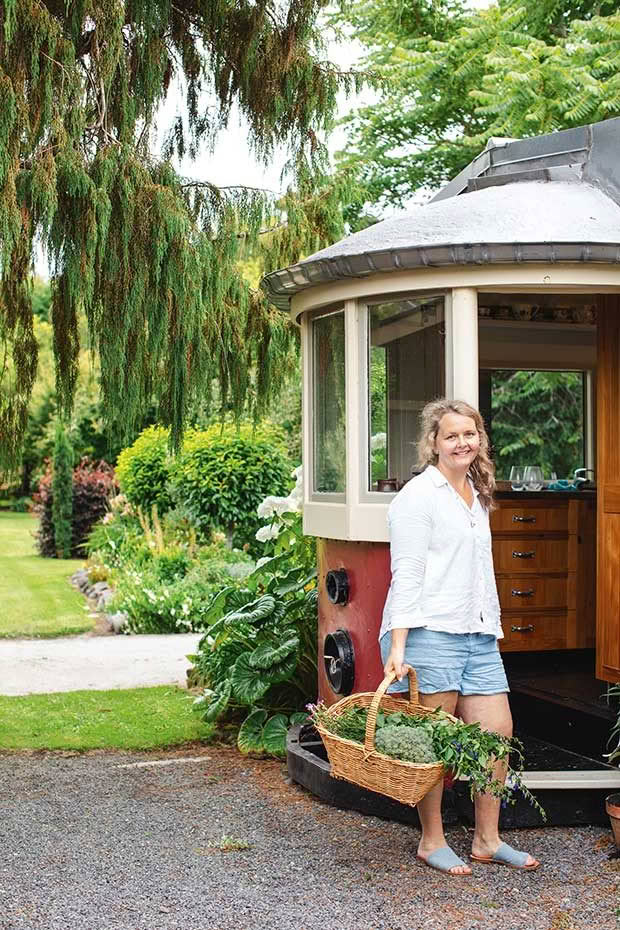
The tram’s entrance was moved to the front so visitors would immediately know they were entering Sally’s home.
When Sally does get time off, she’s back into the gardening gloves and up to her ears in maintaining the nearly half a hectare of woodland and flower gardens that surround her home. The dwelling — a historic tram — and gardens just a quick jog along the road from Blueskin Nurseries provide the canvas upon which Sally paints her life. She’s a plantswoman as well as a landscape architect (her degree is from Lincoln University) who likes, most of all, to create beauty. She tilts her head on one side and “sees” how she wants things to be, looking for the picture that unites plants, colours, textures.
Her own garden, for example, might look all woodland and relaxed, full of trees, hedges and clipped bushes, with lawns stretching between the madly flower
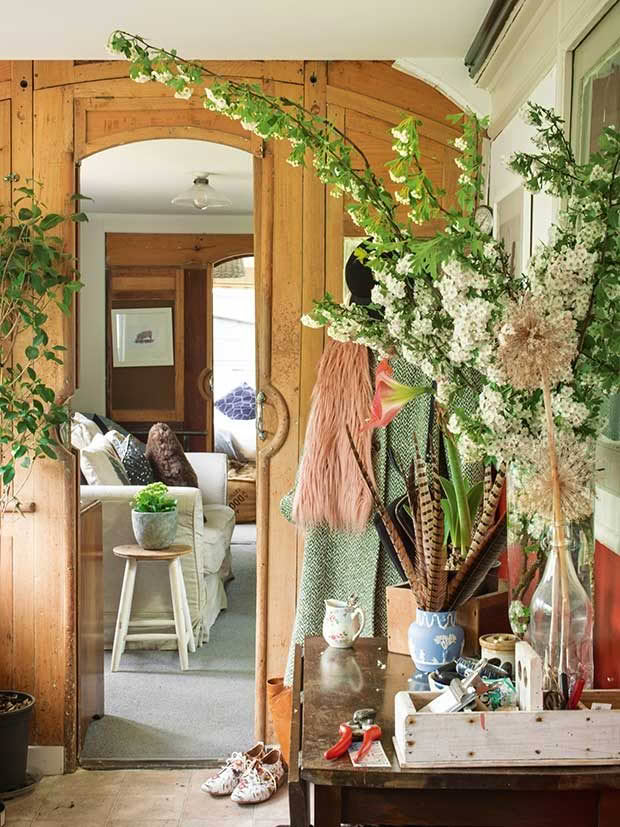
Feathers and hawthorn flowers in the sunroom create an exuberant display.
ing beds surrounding the tram and its lean-to addition, but it didn’t get that way by itself. It is a contrived planting — a colour wheel of all-year flowering even in this sometimes-harsh southern climate. Sally loves to pick fresh flowers not only for herself but also for friends, for whom she presents an open-all-hours florist’s shop.
She says there was little doubt she would become infatuated with gardens and growing. Family photos record baby Sally, wedged in a wicker basket, parked in a wheelbarrow while, alongside, Mark works on the veggie patch. “I was lucky with that crossover of skills and passion from my parents. At uni, some people were never sure of where they were heading, but I always knew I was destined to come back and work for Mum and Dad. Even as a wee kid, I had my own garden and helped in the nursery. I was so lucky to be able to study something I loved.”
Nine years ago, Sally returned to Waitati to work in the business after traveling abroad on graduation (working as a nanny in Britain). Seven years ago, she took over the property with the old tram on it, which for many years had been home to a Polish woman, a former prisoner of war who left crisis-torn Europe as far away as possible. It is quite understandable that a war refugee would arrive in the quiet seaside hamlet of Waitati within earshot of the surf at Blueskin Bay, but it is not so clear how the tram turned up. “No one can work out how it got here. The chassis is incredible; it’s 10 metres long and it weighs tonnes,” says Sally. It was rather sad and rundown when she swept in as its new owner, as were the grounds.
Slowly, one bite of the tram at a time, she’s sanded, scrubbed, painted, curtained, insulated, restored and extended her curiously charming home so that it is no longer dishevelled. Now it’s a fine three-bedroom dwelling with a large sunny sitting area. The driver once stood at his controls, the tram’s engine accessed by a nifty trapdoor beneath his feet. Today the trap door opens to a wine cellar full of Sally’s favourite Central Otago rosés. Her fancy gas oven and fridge were eased in with such precision (and the removal of doors and windows) that they can never be replaced or taken out (except, maybe, in bits).
Where commuters once stood, clinging to leather straps with the clanging bell signaling the tram stops and starts, a sign asks, “Please have exact fare ready”. Tram freaks, and she’s met a few, give Sally appropriate memorabilia for her walls. She loves it all and takes pleasure in titivating her home. She especially adores lighting the tiny, perfectly formed potbelly stove to warm bitter nights.
- Doing up the tram has been a joyful experience. “A lot of thought has gone into the placement of things. Titivating is so exciting.”
- The map of the London Underground through the tram window reminds Sally of her years living in that city.
- A collection of vintage china, including Wedgwood, is displayed throughout, including in the kitchen.
- A botanical painting by Audrey Eagle.
- Three bedrooms ensure plenty of room for visitors. The stack of gardening books and flowering broom in a vase are in Sally’s bedroom.
- Sally started knitting a 1.5-metre-wide cable blanket a few years ago and found the job therapeutic in winter time.
And, like the old tram, the grounds and gardens are slowly and obediently coming to heel — rather more so than her dog, Fergus the sprightly border terrier — though Sally’s goal is not to create a garden that looks too well-organized.
“A lot of garden designers have a particular look, and you can see a garden and say, ‘That garden is designed by such-and-such a person.’ I don’t want to be that kind of designer. I want this garden to be diverse. Now that I have finished planting my flowers, I will move on to shrubs and natives. “You must understand how a plant grows to be able to use it properly in a design. My garden is also my teacher, where I learn more about plants.”
- David Austin rose Skylark.
- Hydrangea Nightingale.
- Delphinium Blue Lace.
- The tulip Pink Diamond is a star in the garden and also played a key role in Sally’s Ellerslie Flower Show garden in 2014.
- Fergus the border terrier loves chasing anything that moves including butterflies, birds, rodents and rabbits. He also loves climbing trees but can’t get down by himself.
- The yellow garden has been successful, particularly in the winter when its strong foliage colour of Cupressus macrocarpa Golden Halo topiaries, Euonymous variegata and hebe James Stirling light up the days.
- Astrantia major Alba.
- Verbascum.
- Yellow dahlia.
- Creeping bellflower.
Sally works with eight or nine garden and landscape design clients at a time, although she avoids advertising as she doesn’t want many more. “This is a seven-days-a-week business, so there is no give. That’s why my garden is the way it is. It is my asylum, my reprieve, my de-stress. I believe that gardening reduces stress, so it’s a huge benefit for mental health. Seeing something grow, you get hooked easily on gardening.”
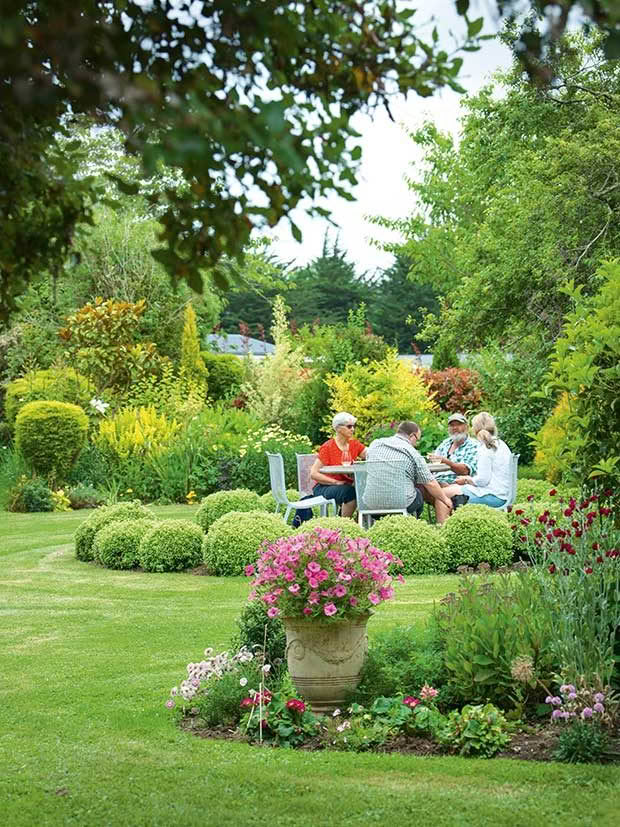
In the “gin garden”, where pittosporum Frankie’s Folly naturally forms compact balls, Sally enjoys a drink with her parents Clare and Mark and younger brother Hugh.
As much as she enjoys running a garden centre and creating beauty in her own and others’ gardens, she also loves helping people become interested in gardening. “Getting people hooked and enthused by gardening is my passion. In general, people start with edibles, then once they have their own property, they see the value in making it look good. And as houses are so hard to obtain these days, it is important to garden them as well as they can. It is ridiculous, there are so few homes on the market in Dunedin at the moment, lowest it’s been in 20 years. They are getting snapped up instantly.
“The more gardeners the better, and once I get them into edibles, then I can get them into other sorts of gardening. Greening the space; I’d do the whole world if I could. And everybody would be a gardener.” Her latest convert, skilfully manipulated by the gift of speedy-sprouting mustard seeds, is just three years old. “He’s my wee friend, and he’s so excited by his sprouts he came to show me. He’ll be a gardener one day.”
NEW OLD CHURCH
The latest addition to Blueskin is the former St Brigid’s Catholic Church which had stood next door, but with its back to the Browns, forever and ever amen. That was until Mark and Clare purchased it 20 years ago and used it for storage.
Five years ago, restoration began with Sally’s brief to the architect to reorient the church door to open towards the café and garden centre so it could be incorporated into the business, and gardens could be developed around it. Its simple beauty, lit by a pair of plain but arresting stained-glass windows designed by artist Ralph Hotere, who lived over the hill in West Harbour, lends itself to small gatherings, such as boutique weddings, lectures and gardening classes.
“We’ve had a few dinners in the church, and it is lovely for small gatherings. We love it, and we valued it and wanted to look after it. Like any old building, it was very expensive when we started.
“We can only work on projects like the church in the winter and spring as the summer is too busy.”
GREENER THAN GREEN
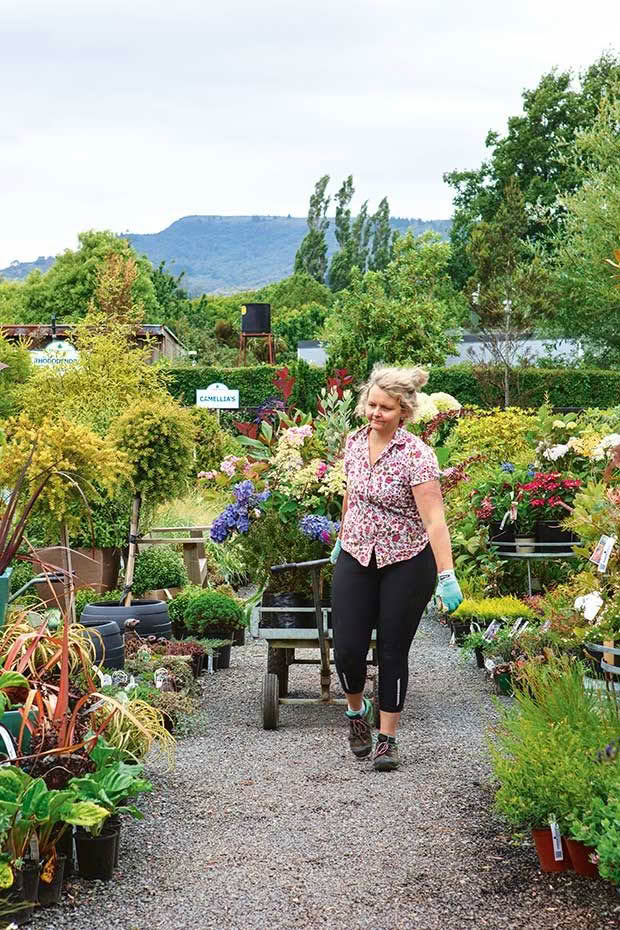
Six years ago, Blueskin invested in a $50,000 solar-generation system that will have paid itself off this year. On sunny days, the system generates 60 to 70 per cent of power usage across the garden centre, café, church and nursery as well as a small independent retail operation at the entrance gate. Sally says the Browns generate quite a lot of electricity even on dull days.
Hagan Bruggeman and James Hardisty from Control Focus, their energy specialists based in Waitati, advised against purchasing batteries when the system was first installed as Blueskin draws power during daylight opening hours (as it is being generated) and because the battery technology is improving rapidly, and prices are coming down. The next step is to purchase batteries for storage.
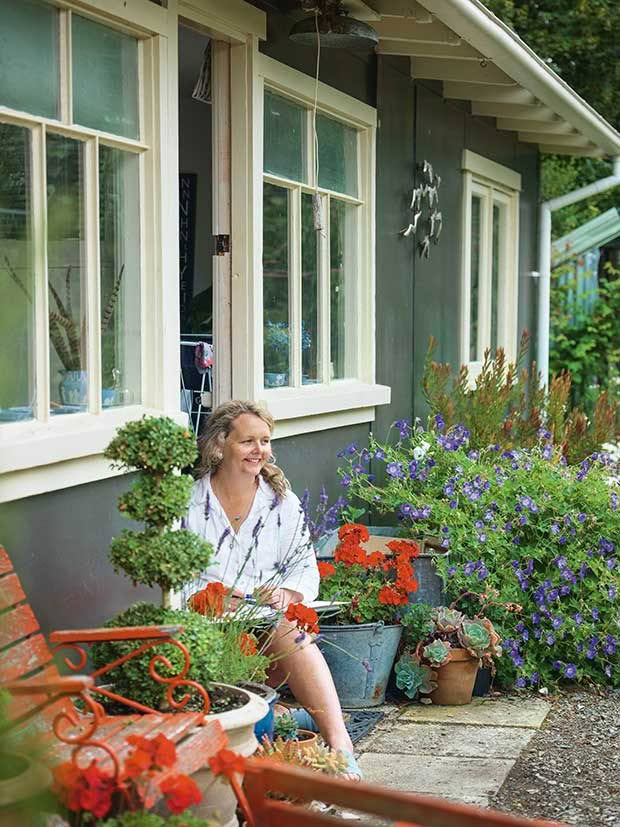
“The hot summer of 2017—18 saved us $3000 on our summer power bill even with the drag of coffee machines and dishwashers.”Large ponds store rainwater from all the roofs, which is then pumped to irrigate the garden centre and nursery plants.
THE POINTY EDGE
“Each business relies on the other, but probably the café is the hardest to get right. It is so fickle, so weather-dependent and hospitality is hard work. We cook everything on site except our bread. We even make all sauces, chutneys, soups, slaws and salads. The philosophy is that we should be able to grow it here. Dad grows a lot for the café, we get 100-plus pumpkins from his patch, and there’s so much you can do with pumpkins. Luckily, Mum taught all her children to cook, and I still love it. And she is great at making sauces and chutneys. It’s something we both love to do, although I add a lot more spice.”
Love this story? Subscribe now!
 This article first appeared in NZ Life & Leisure Magazine.
This article first appeared in NZ Life & Leisure Magazine.
